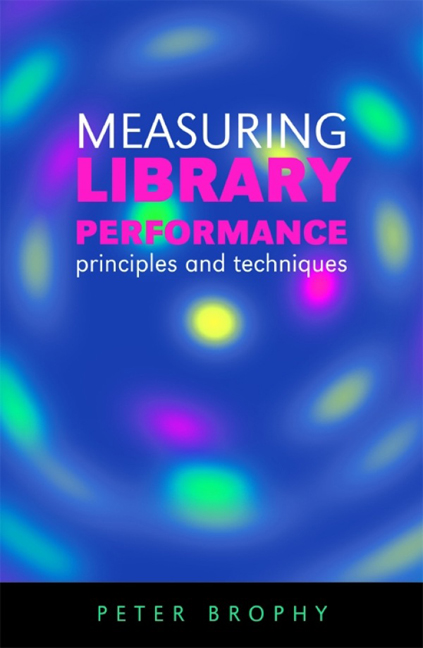Book contents
- Frontmatter
- Contents
- List of figures
- List of tables
- Preface
- Acronyms and abbreviations
- 1 Background
- 2 Theoretical considerations
- 3 User satisfaction
- 4 Impact on users
- 5 Social and economic impact
- 6 Inputs
- 7 Processes
- 8 Outputs
- 9 Staff
- 10 Infrastructure
- 11 Services for all
- 12 Benchmarking
- 13 The balanced scorecard
- 14 Standards
- Appendix 1 Data collection methods
- Appendix 2 The analysis of data
- Appendix 3 The presentation of results
- Index
2 - Theoretical considerations
Published online by Cambridge University Press: 08 June 2018
- Frontmatter
- Contents
- List of figures
- List of tables
- Preface
- Acronyms and abbreviations
- 1 Background
- 2 Theoretical considerations
- 3 User satisfaction
- 4 Impact on users
- 5 Social and economic impact
- 6 Inputs
- 7 Processes
- 8 Outputs
- 9 Staff
- 10 Infrastructure
- 11 Services for all
- 12 Benchmarking
- 13 The balanced scorecard
- 14 Standards
- Appendix 1 Data collection methods
- Appendix 2 The analysis of data
- Appendix 3 The presentation of results
- Index
Summary
■ Introduction
All performance measurement is a form of research, involving structured investigations to try to reach a better understanding of a particular phenomenon. Because of this, it is useful to explore briefly some of the theory underpinning research studies and the gathering of evidence. This chapter offers a brief introduction to some of the key concepts. For more information the reader is directed to Robson (2002) or Sarantakos (1998).
■ Causal relationships
At the heart of all research is a belief that relationships between observed phenomena may be due to causality, and that elucidating what causes something to happen, or to be experienced, or to be felt, enables the development of knowledge. When libraries examine levels of user satisfaction, they are not simply interested in recording percentages of users with particular views but in finding out why these levels of satisfaction exist and establishing how they may be improved. Thus studies that seek to measure performance will always have an underlying aim to illuminate cause and effect. This means that such studies are never simply observational or descriptive: they seek to be incisive and analytical.
■ Theoretical perspectives 1: the positivist standpoint
Deriving originally from the work of August Comte, positivism sees scientific method as the only way to achieve new knowledge and therefore all research efforts should be clearly designed on this basis. Karl Popper, most notably inThe Logic of Scientific Discovery published in 1934, argued that the critical issue is that of falsifiability. This in turn relies on the idea that progress is made by developing hypotheses and then by testing them to see if they are true. Popper pointed out that the truth of a hypothesis can never be demonstrated with 100% certainty since a case might exist, which has not yet occurred or been tested, which would disprove it. A single instance showing the hypothesis to be false disproves it and a new hypothesis then has to be formulated, to be disproved in its turn. So science progresses not by proving but by disproving each hypothesis.
This leads to an approach to research where the formulation of a hypothesis is the first crucial step, with research methodologies then selected to enable the hypothesis to be tested.
- Type
- Chapter
- Information
- Measuring Library Performanceprinciples and techniques, pp. 19 - 34Publisher: FacetPrint publication year: 2006



